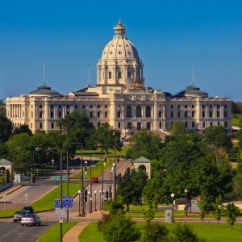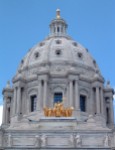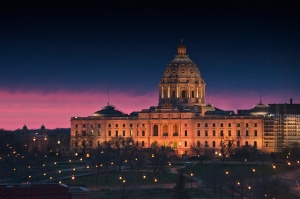 The following legislative updates were written by Elaine Keefe, library lobbyist for the Minnesota Library Association (MLA) and Information Technology Educators of MN (ITEM). CMLE helps pay this lobbyist to serve the best interests of academic, K-12, public, and special libraries in Central MN. (Latest information is at the top)
The following legislative updates were written by Elaine Keefe, library lobbyist for the Minnesota Library Association (MLA) and Information Technology Educators of MN (ITEM). CMLE helps pay this lobbyist to serve the best interests of academic, K-12, public, and special libraries in Central MN. (Latest information is at the top)
Received Monday, May 2, 2016 at 12:25 PM
The Senate bonding bill (SF 2839) was released this morning, and it contains good news for libraries. Here are the specifics:
Library Construction Grants: The bill includes $2 million for the grants. There are no earmarks, so the entire $2 million would be available for competitive grants. $2 million was the amount included in the governor’s budget.
East Central Regional Library Headquarters and Cambridge Public Library: The bill includes $2.414 million for a new building. That was the amount requested by the city of Cambridge. This must be matched with an equal amount of funding from non-state sources.
Bagley Public Library: The bill includes $50,000 in general fund money for a grant to the city of Bagley for “improvements, furnishings and equipment for the city’s library or to reimburse the city for improvements, furnishings and equipment for the city’s library.” The language is a little unusual because the library project was completed two years ago. The 2014 bonding bill included $50,000 for the project, but the state later determined that this was an ineligible use of state bond funds and in 2015 the appropriation was canceled. That is why this year’s appropriation is from the general fund.
Minnesota State Community and Technical College, Wadena Campus: The bill includes $820,000 to relocate the current library to a new space and to convert the vacated space to a student services center. $820,000 was the amount included in the governor’s budget. This was the only higher education library project proposed this year.
East Side Freedom Library: The bill includes $500,000 from the general fund to renovate the former Arlington Hills Public Library in St. Paul, which recently became the home of the East Side Freedom Library. The library is operated by a nonprofit. Its mission “is to inspire solidarity, advocate for justice and work toward equity for all.”
The Senate bonding bill is even larger than had been rumored, spending a total of $1.8 billion. That is significantly larger than the $1.4 billion proposed by Governor Dayton and triple the amount that House leaders have said they want to spend. Even so, many requests were not funded at all or were funded well below the amount requested. Senator Leroy Stumpf, chair of the Senate Capital Investment Committee, said they received $5.2 billion in requests. The bill will be heard in the Senate Finance Committee tomorrow and then will head to the Senate floor.
Received Friday, April 29, 2016 at 3:23 PM
The legislative session must end no later than 3 weeks from Monday. Here is an update on issues of interest:
Supplemental Budget: The House and Senate passed their omnibus supplemental budget bills this week. The Senate has combined all of its budget bills into one omnibus supplemental budget bill (SF 2356).
The House split the budget into three smaller omnibus budget bills, as follows:
Education and Higher Education (HF 2749)
Agriculture, Environment and Jobs (HF 3931)
HHS, Public Safety and State Government (HF 3467)
How the bills will be conferenced has not been announced, but it is widely assumed that there will be one conference committee made up of ten members. The conferees are expected to be appointed early next week.
Broadband: Last month Governor Dayton proposed $100 million in Border-to-Border Broadband Grants. The Senate included $85 million in its budget bill, while the House included $15 million for FY 17 and $25 million in FY 18. The House also included $7 million for broadband grants for schools in its education finance bill. Those who attended Library Legislative Day heard me describe this new grant program in detail. For those who were not there, the proposal actually would fund two separate types of grants, as follows:
Broadband Wi-Fi Hotspots: A school district may apply for a grant to support wireless off-campus learning through a student’s use of a data card, USB modem or other mobile broadband device that enables the student to access learning materials through a mobile broadband connection. A school district that qualifies for sparsity revenue may apply for a grant to provide Internet access on school buses. The maximum grant is $100,000 for a school district applying by itself or $200,000 if applying with a community partner such as a public library, community education department or adult basic education program provider.
Capacity Building: A school district that is a member of a telecommunications cluster may apply for a grant of up to $100,000 to be used in any manner and with any community partners that will allow the district to expand telecommunications access for students, teachers and community members.
Of the $7 million appropriated, $5 million is for the broadband Wi-Fi hotspot grants and $2 million is for the capacity building grants. This is a one-time appropriation.
Total Operating Capital: The Senate has included in its budget $10.1 million to provide a one-time increase of $10.88 per pupil in total operating capital. There is a list of 25 permitted uses of this funding in statute. Among the permitted uses are:
“To improve and repair school sites and buildings, and equip or reequip school buildings with permanent attached fixtures, including library media centers”
“ To purchase or lease interactive telecommunications equipment”
“To purchase or lease computers and related hardware, software, and annual licensing fees, copying machine, telecommunications equipment, and other non-instructional equipment”
“To purchase new and replacement library media resources or technology”
“To purchase or lease telecommunications equipment, computers and related equipment for integrated information management systems”
“To pay personnel costs directly associated to the acquisition, operation and maintenance of telecommunications systems, computers, related equipment, and network and applications software”
After School Grants: The Senate has included in its budget bill $500,000 in one-time funding for grants to after school programs. This is the program that we have worked with Ignite Afterschool to support.
Bonding: As you may recall, Governor Dayton proposed a $1.4 billion bonding bill, which would be the largest in state history. It includes $2 million for Library Construction Grants. House leaders have said they will spend no more than $600 million on a bonding bill, but have not released any specifics and are not expected to do so anytime soon. Rep. Paul Torkelson, chair of the House Capital Investment Committee, has said that the bonding bill’s fate will depend on reaching agreement on other issues such as taxes and transportation. House leaders have characterized the bonding bill as “dessert,” which must come last. The Senate is scheduled to release its bonding bill on Monday. It is rumored that it will be a little larger than the governor’s proposal.
Legacy: The House has passed its omnibus legacy funding bill, HF 3829, out of committee. Unlike the other three funds the Outdoor Heritage Fund appropriations are made annually, and the bulk of the bill is made up of those appropriations. However, there is one provision of interest to libraries in the bill. It reinforces the requirement that legacy funds are to be used to supplement rather than supplant existing funding by requiring any entity requesting funding from the Arts and Cultural Heritage Fund to inform the Legislature “if the entity funded the same project or program after 2006 and how the previous project or program was funded.” This is based on a recommendation from the Legislative Auditor.
Because sales tax revenue has lagged behind projections, there are deficits in three of the four legacy funds, including the Arts and Cultural Heritage Fund. To resolve the deficit, Minnesota Management and Budget plans to enact a shift by authorizing agencies to “allot only 97% of their FY 17 appropriations, holding back 3% of each appropriation for spending in the following fiscal year, FY 18.”
Elaine Keefe
Capitol Hill Associates
525 Park Street, Suite 255
St. Paul, MN 55103
(cell) 612-590-1244
elaine@capitolhillassoc.com
Image credit: http://tinyurl.com/oddkzbj, licensed under CC BY-NC-SA 2.0




